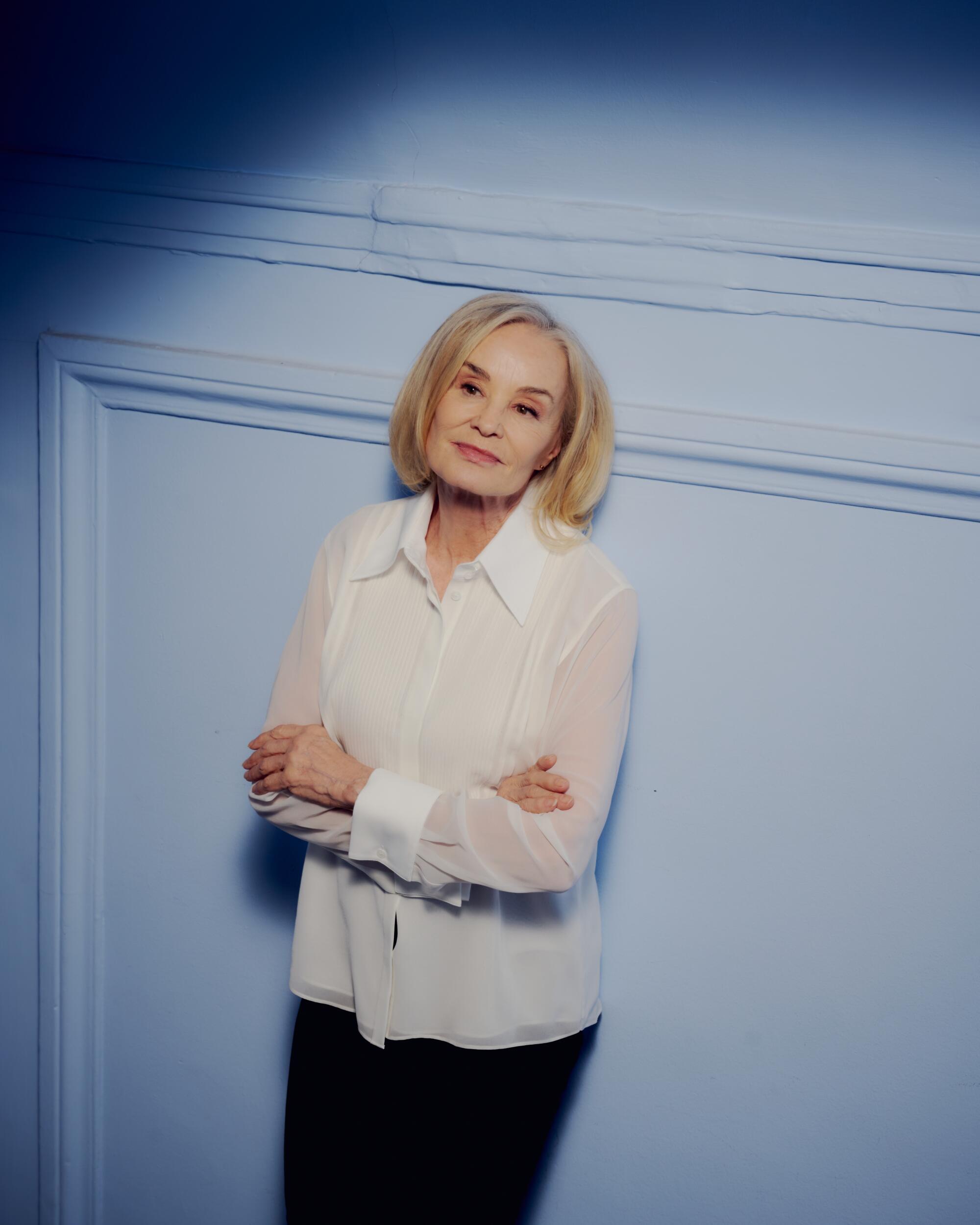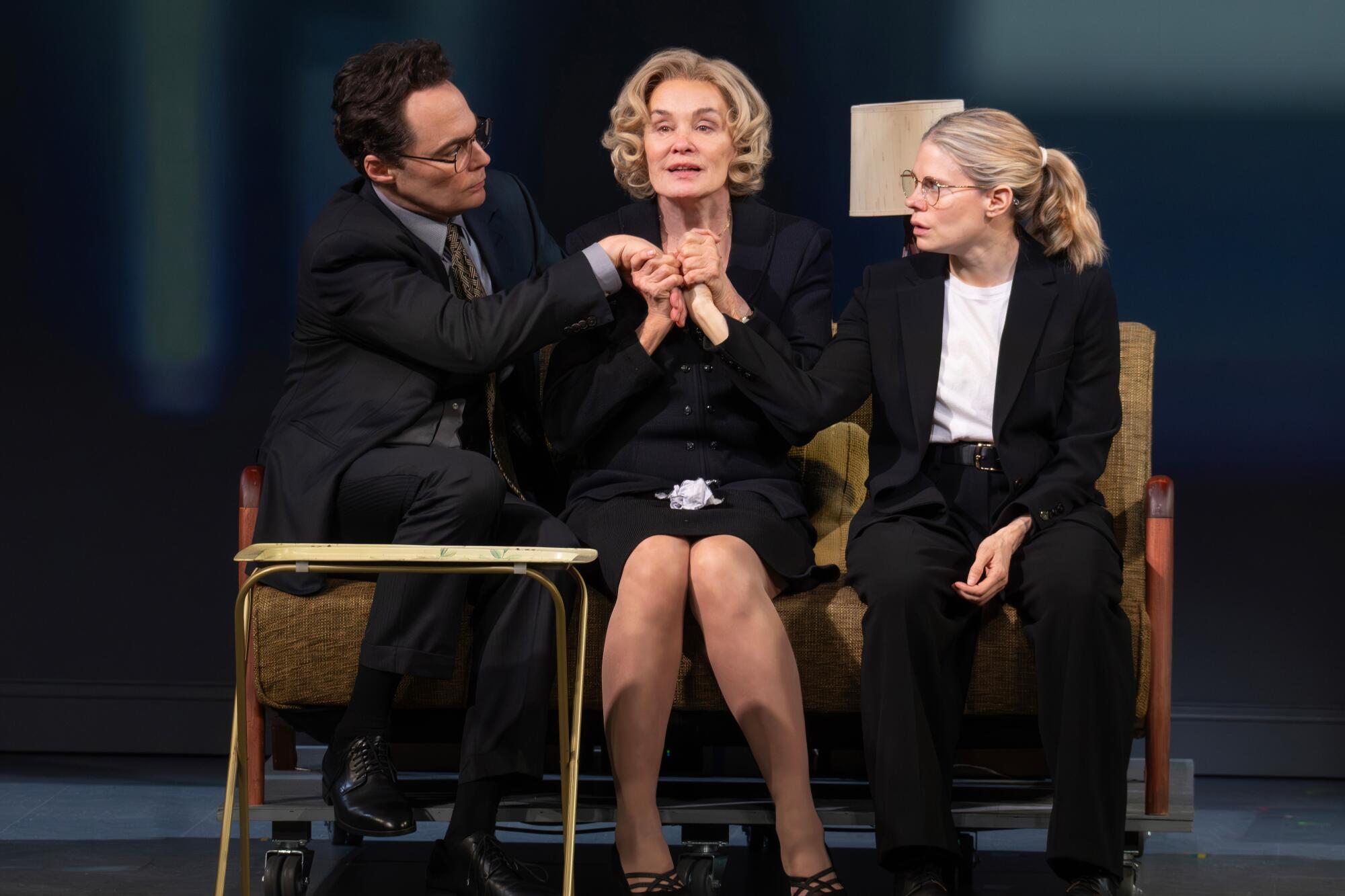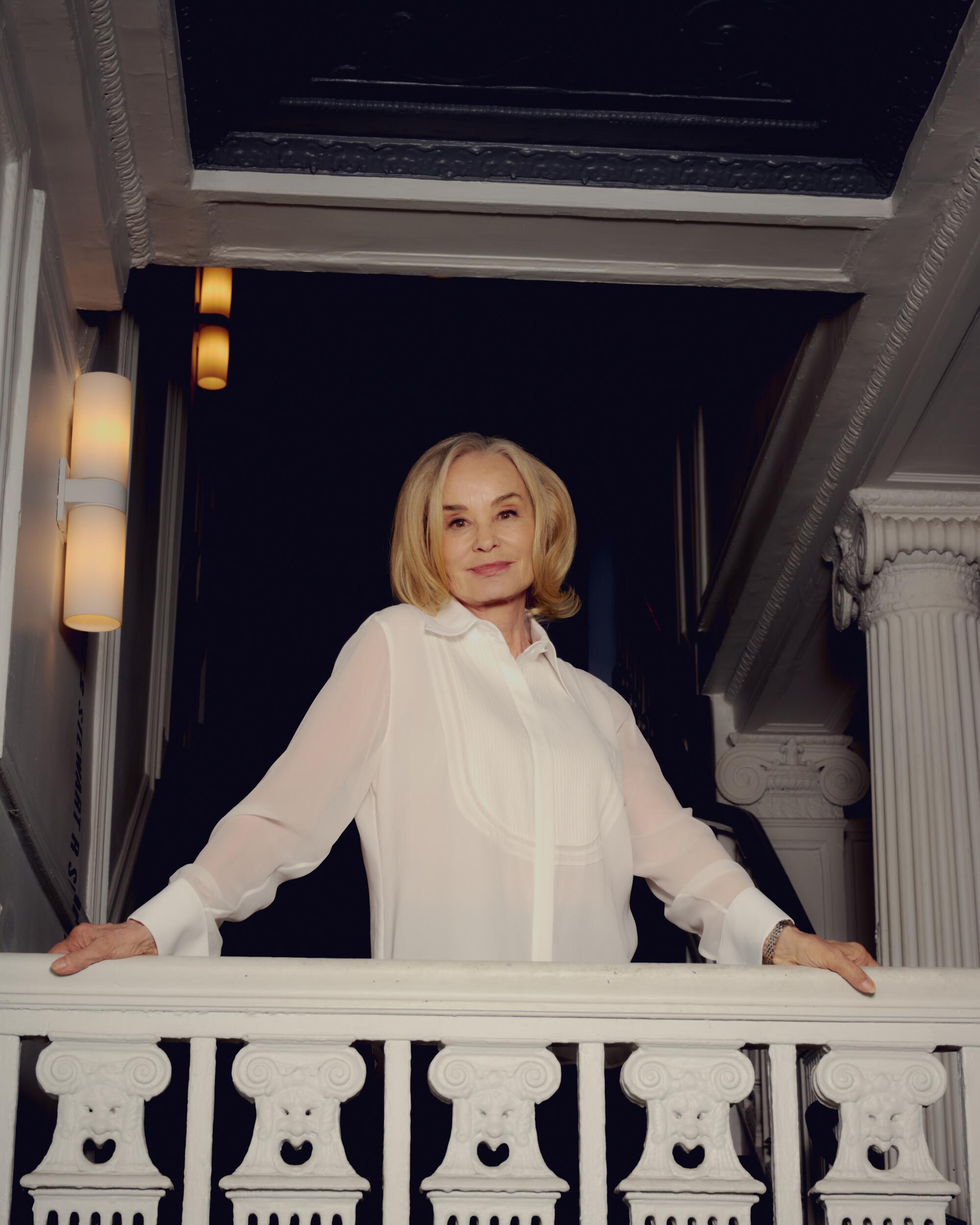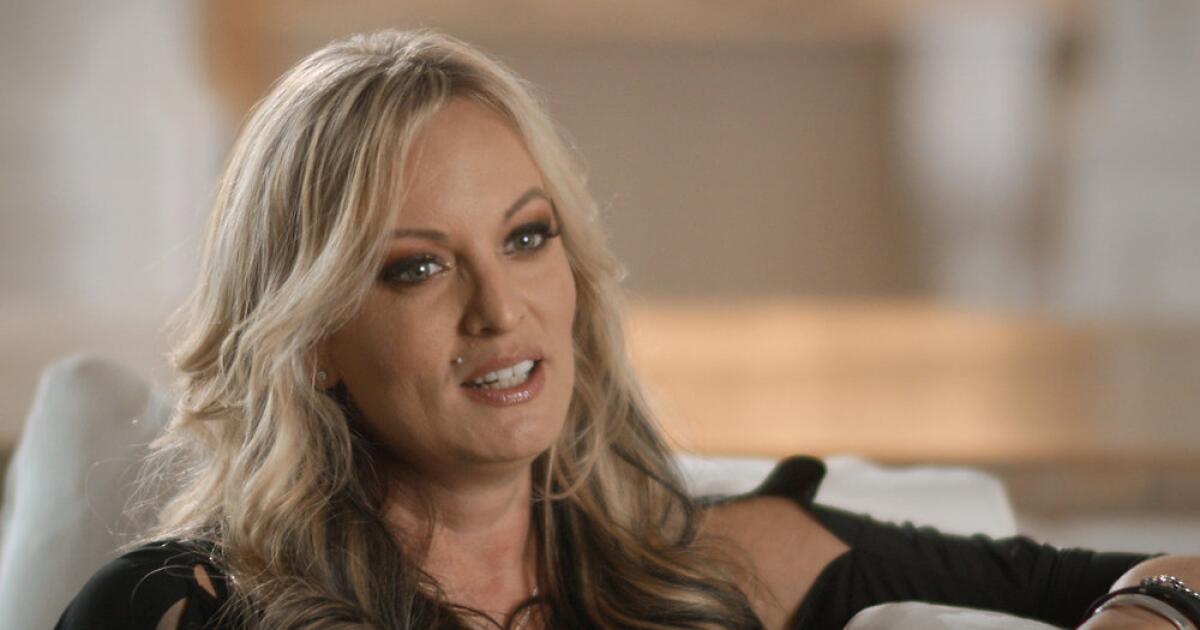Jessica Lange began her Broadway career playing Blanche DuBois in a 1992 revival of “A Streetcar Named Desire.” It was a challenge the two-time Oscar winner admits she wasn’t ready for.
“I was very naïve,” she said via Zoom from New York, where she’s starring in Paula Vogel’s “Mother Play: A Play in Five Evictions.” “It was my first Broadway play and I stepped into this colossal play and character. I don’t want to shift anything, but I needed help and I didn’t get it. I wish I had more guidance. Someone to explain to me what it’s like to be on stage — and then the first thing you tackle is Blanche DuBois. I mean, Jesus.”
Lange didn’t let the “Streetcar” experience stand in the way of her theatrical ambitions. Since Blanche, she has stepped into the historic roles of two larger-than-life mothers on Broadway and in the West End: Amanda Wingfield in Tennessee Williams’ “The Glass Menagerie” and Mary Tyrone in Eugene O’Neill’s “Long Day’s Journey Into Night.” (For her portrayal of Mary in O’Neill’s lacerating family drama, she won a Tony Award.)
In “Mother Play,” a Second Stage world premiere at Broadway’s Hayes Theater, Lange is taking on another maternal quagmire: Phyllis, an alcoholic mother raising on her own two children, whose queer identities she would like to squelch. Like “The Glass Menagerie” and “Long Day’s Journey Into Night,” Vogel’s drama is a deeply personal play, the work of an artist unpacking those sealed boxes from the past that contain the most forbidding family secrets.
Lange’s Tony-nominated performance is one of the most memorable of Broadway’s busy spring season. Notably, it’s the first time she’s originated a role in the theater since she began venturing onto the stage in the early 1990s after establishing herself as one of the finest actors of her generation.
Jessica Lange in “Mother Play.”
(Joan Marcus)
“The plays I’ve done before this one have all been classics of the American canon,” she said. “And since doing ‘Long Day’s Journey Into Night’ eight years ago, I’ve been approached by people asking what I would like to do next. I never came up with something that I felt really passionate about and that I was still age appropriate for. Because at a certain point, all the parts you wanted to play, you’re now 20 years too old to do.”
But then “Mother Play” came along. “And I thought, ‘Well, yes, I would love to do a brand-new play,’” she said. “Something that’s never been seen. There are no other performances to compare it to. It’s just like a clean slate. You just walk out there, and people are going to see and hear it for the first time. They’re going to learn about a character that nobody has ever played before. So that was the reason that I signed on, other than thinking that the play was really saying something and well written.”
Lange is accustomed to working on new material on screen, but committing to an untested theatrical role carried extra risk. “The reality is you’re opening a brand-new play cold on Broadway after only three weeks of rehearsal,” she said. “And then you start to think, ‘What was I nuts?’ But we were lucky. It all came together.”
The play, directed by Tina Landau, features two other cast members, both of whom also received Tony nominations: Jim Parsons, who plays Carl, Phyllis’ precocious gay son who dies of AIDS, and Celia Keenan-Bolger, who plays Martha, Phyllis’ lesbian daughter, who is the custodian of the play’s difficult family memories.
The culmination of a lifetime of playwriting craft and inner work, Vogel’s Tony-nominated play is composed of vintage snapshots of an economically precarious childhood, dominated by a mother whose life fell cruelly short of her own expectations. Phyllis never lets her children forget that it’s their deadbeat, two-timing father who is to blame for their troubles. The close, supportive relationship of the siblings provides a bulwark that enables them to survive the fallout of her bitter disappointment.
Swiftly spanning decades (from 1964 to the 21st century), “Mother Play” avails itself of a spry theatrical freedom (not unlike Vogel’s “The Baltimore Waltz,” her beautiful play inspired by her late brother Carl). The cockroaches in the cheap apartments Phyllis is forced to rent for her family dance during scene changes, but a powerful emotional realism runs through the work.
Lange, who turned 75 in April, said that she was excited by the challenge of “moving a character through 40 years without the use of makeup, prosthetics and wigs.” Time on stage is seemingly under her command. “We’ve all done that on film, where we’ve aged or un-aged or whatever it is,” she said. “But this had to be through the physical life, the voice, the energy level, and that was a great exercise for me.”

Jessica Lange, the star of “Mother Play.”
(Evelyn Freja / For The Times)
The production keeps evolving. “This is why people do off-Broadway runs for eight weeks or whatever before moving to Broadway,” she said. “Because it continues to grow and to develop and to deepen. We’re doing it in front of our audiences, but it’s been an amazing experience.”
To call Phyllis a problematic mother would be like calling the Statue of Liberty tallish. She swills gin after returning home from her job at the post office, swoons moodily to “Moon River” on the radio and wonders how it all went wrong. One day she shows up in a new Chanel suit, bought at a thrift shop. As she models the outfit for her children, her hopes for the future are momentarily revived, even as she’s alarmed that Carl has too much interest in fashion and Martha has none at all.
The product of a bygone era, Phyllis is a prisoner of her prejudices. She reinforces a strict code of gender conformity on her children, who openly flout her edicts. Homosexuality in a son is something she might be able to overlook if the matter were discreetly handled, but lesbianism is a bridge too far for a woman whose sense of self-worth is tied to conventional standards of femininity.
Phyllis admits herself that she wasn’t equipped to be a mother, that she became one accidentally because of her fatally charming, utterly untrustworthy and ultimately abusive former husband. But her own selfishness crosses a line when she throws Carl out when he needs her most.
“A mistake that could have been made was trying to make this woman likable,” Lange said. “Which I think is always a trap actors fall into. She was so precisely written that it was just a question of accepting that this is a woman who has made terrible mistakes. Who has made the worst decisions a mother or a human being could make. There’s any number of reasons to not like her. But the challenge is to explain her as best you can.”
Lange took note of Phyllis’ background: “We have to remember that she’s a child of the Depression, growing up in the South. When her son comes out, it’s 1968. It’s not accepted as easily as it is now. I’ve talked to a lot of people, even younger people, who have said that was their experience with their mother or family or whatever. So at a certain point you have to forget about the likability factor and just say, ‘OK, this is who this woman is for all her faults.’ Maybe there were good things. She clearly loved that boy so much, but maybe she just made an unforgivable decision in the universe.”
Carl never gives up on his mother. As frustrated and hurt by her as he is, he remains dazzled by her. With Lange in the role, it’s easy to see why. While emanating from Martha’s conflicted memory, the play understands Phyllis partly through his sympathetic eyes.

Jim Parsons, from left, Jessica Lange and Celia Keenan-Bolger in “Mother Play.”
(Joan Marcus)
“Paula said she was writing this to come to terms with her mother, almost like an exorcism of all that old anger,” Lange said. “I don’t mean to speak for Paula, but part of the desire and impetus to write this play is to somehow throw that anger into the sea. To let it go, finally. Which I think is one of the great life lessons — to learn how to forgive.
In “The Great Lillian Hall,” an HBO film directed by Michael Cristofer that premieres May 31 and will stream on Max, Lange plays another ill-equipped mother, a renowned stage actress forced to reckon with insuperable realities. While struggling with her memory in rehearsals for Chekhov’s “The Cherry Orchard,” Lillian is diagnosed with a form of dementia. Having lived for art — and the romance around it — she must come to terms with her encroaching dependence.
Margaret, Lillian’s daughter (a superb Lily Rabe), is accustomed to her mother’s self-preoccupied ways. When the two finally have their hospital room confrontation, Rabe and Lange wring every sorry, angry truth from the scene.
“I love playing wildly emotional characters,” Lange said. “That’s always been the most interesting to me — characters teetering on the edge and falling off every once in a while, like Frances Farmer or the character in ‘Blue Sky.’ Characters whose emotional upheavals are extreme. This is Phyllis more than Lillian Hall, but Lillian has them too.”
Lange said that she has long wanted to work with Cristofer, a Pulitzer Prize-winning playwright (“The Shadow Box”), who happens to be an old friend. She felt secure knowing that the director of this backstage drama (written by Elisabeth Seldes Annacone and also starring Kathy Bates) had extensive theater experience of his own.
“I’ve always loved ‘All About Eve’ and the brilliant John Cassavetes film ‘Opening Night,’ ” Lange said. “And this was an opportunity to delve into that world on film, but also to play Chekhov, which is something I’m never going to do in my life.”
Not play Chekhov? But “The Cherry Orchard” is perfect for her.
“I think I’m too old,” she said. “ I’m too old for everything now.”
Her schedule belies this remark. Lange may be looking forward to taking a long break after “Mother Play” ends on June 16, but retirement isn’t in the cards. Her upcoming projects include the release of the film version of “Long Day’s Journey Into Night,” in which she reprises her acclaimed performance of Mary Tyrone, a role she speaks of with almost religious reverence.
“The Great Lillian Hall” offered a taste of “The Cherry Orchard” outside of the rigors of a Broadway schedule. “We rehearsed the play with a great cast of actors,” she said. “And that was so exciting. And those scenes were weaved into the film because there were parallels between what Lillian Hall is losing and what her character in ‘The Cherry Orchard’ is losing. The film is about loss and memory, and all those things just felt wonderfully connective.”
Are there any classic plays that still call out to her to do?

Jessica Lange, the star of “Mother Play.”
(Evelyn Freja / For The Times)
“I kind of aged out of the ones that I had thought about doing,” Lange said. “Like ‘Who’s Afraid of Virginia Woolf?’ or ‘The Night of the Iguana.’ I always thought the character of Hannah was a beautiful role but at this point in my life I can’t have a grandfather unless he’s like 150 years old. So there are certain ones that are no longer feasible.”
When asked about her acting influences, she named two Method standard-bearers, Kim Stanley and Geraldine Page. She worked with the emotionally volcanic Stanley in “Frances” and on a TV production of “Cat on a Hot Tin Roof” at a formative point in her career.
“I had a tape of Kim in ‘The Goddess,’ ” Lange said. “It’s probably worn out by now. But years ago, before I’d start a project, I would watch it to remind myself of what great acting — what dangerous acting — is. Kim has always been for me the gold standard.”
When I mentioned that Page was in a play by Sam Shepard, with whom Lange had two children, she immediately supplied the title: “A Lie of the Mind.” Is it true that “Fool for Love,” one of Shepard’s masterpieces, was sparked by the intensity of their love affair? “Yeah, I think Sam wrote it at the beginning of our relationship,” she said.
Lange worked with Shepard, who died in 2017, on several occasions on screen. Did she ever consider doing one of his plays?
“Yes, but for one reason or another, it just wasn’t the right time or place,” she said. “At one point, we were talking about something, but I was pregnant. And another time life just somehow didn’t allow it. But there’s maybe one or two parts I could still play in a Sam Shepard play. His dialogue is so musical — it’s one of the most beautiful things about his work.”
Sensitive to the rhythms of dramatic poetry, Lange seems custom built for the high-wire lyricism of Tennessee Williams. Her voice on screen has a poetic quality (listen to her cello-inspired intonations in the 1989 Costa-Gavras film “Music Box”). It’s taken her time to develop as potent a stage instrument, though her Southern lilt in “Mother Play” subtly contours her character.
Lange is a major Hollywood star, with all the layers of protection that come with such status. But she lives her life like an artist, which is to say a person of heightened sensibility and discipline.
Her career arc has had its ups and downs. She made her film debut in the 1976 remake of “King Kong,” but the freshness of her Oscar-winning performance in “Tootsie” and the harrowing nature of her portrayal of Frances Farmer in “Frances” quickly proved that she was more than a beauteous scream queen. After her movie star heights in the 1980s and early 1990s, when she worked with some of the finest film directors (Sydney Pollack in “Tootsie,” Martin Scorsese in “Cape Fear,” Tony Richardson in “Blue Sky,” for which she won her second Oscar), she said there was a falling away of things that interested her.
“I also think I got distracted,” she said. “I lost interest in the films I was doing. And I wanted to be home more with my family. And then there was a fallow period, where I didn’t feel like I was doing good work. There was maybe a 10-year or more period of time when it was just not that interesting to me anymore.”
It was “Grey Gardens,” the highly acclaimed 2009 TV movie, that turned things around for her. “Suddenly,” Lange said, sounding like a Williams heroine in the throes of resurrection, “it all came alive again.”
While returning to the stage every decade since the 1990s, she’s been building an impressive body of TV work. Ryan Murphy extended her fame to a new generation and cultural era by casting her in two of his signature franchises, “American Horror Story” and “Feud.”
“There was a time when if you were a TV actor, you were a TV actor,” the three-time Emmy-winner said. “And if you were a film actor, you were a film actor. But now everybody’s doing everything, and thank God. I remember when I was working on stage in London and actors would be on stage at night and doing a radio play or filming in the day. There wasn’t that kind of pigeonholing that there was in the States.”
Photography is a major passion of Lange’s. What started off as a hobby became a second career with exhibitions and books.
“I didn’t pick up a camera probably until the mid 1990s, but I had been around a lot of photographers when I first lived in New York,” she said. “I knew Robert Frank, Danny Lyon, Larry Clark. It was always something that I was thrilled and fascinated by. And then, when I was able to, I started collecting photography, so I’m surrounded by the work of the great black-and-white photographers.”
Does she see a connection between photography and acting?
“There is a similar discipline,” she said. “In stage or film acting, you have to remain present. You have to absolutely stay inside the moment to find the depth of it. And with photography, it is also an exercise in being present. Because especially if you’re doing street photography, which is the only way I do it, just walking around with a camera, you have to be absolutely present to capture one specific moment.”
There’s a scene in Vogel’s play that’s called “Phyllis’ Ballet.” Lange’s character, older and alone, has returned home from work to the emptiness of her apartment. We see her attempting to fill up the time between drinks. Lange, present for every second of this solitary 12-minute stretch, doesn’t need dialogue to communicate what her character is thinking and feeling. Acting for her is an inside job, and there’s no better example on the New York stage right now than this capstone performance of her glorious career.















